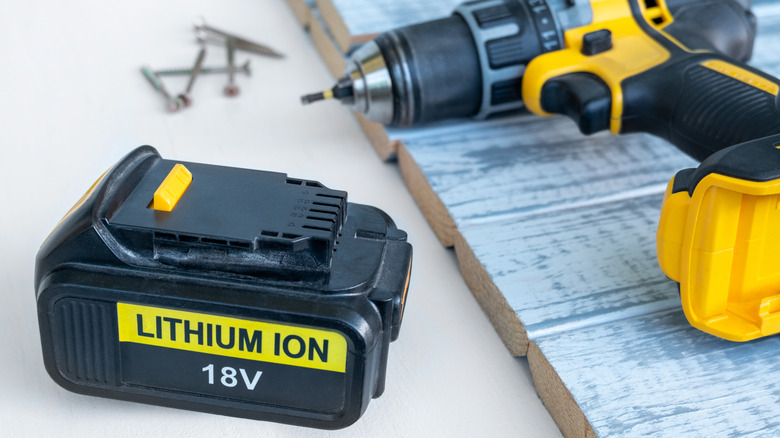Yes, Lowe's Recycles Power Tool Batteries – Here's What To Know Before You Go
As convenient as the rechargeable battery packs that power your tools are, they have the same critical weakness that all rechargeable or disposable batteries have: They can't last forever. No matter how high-quality your power tool battery is, years of charging, depleting, and recharging, not to mention the usual degree of jostling and vibrating they undergo, will gradually diminish their ability to properly hold and deliver a charge. Sooner or later, the battery will fail, and you'll have to dispose of it.
It's vitally important that you don't just drop your power tool batteries in the regular trash, as leaking batteries in landfills are extremely bad for the environment. Instead, plan a journey to your local Lowe's hardware store to recycle it. Thanks to an enduring partnership with recycling organization Call2Recycle, Lowe's serves as a convenient drop site for dead power tool batteries.
You can deposit your old packs into the disposal box, and Call2Recycle's experts will handle their safe disposal. Before you drop an entire junk drawer's worth of dead batteries into the bin, though, there are some safety precautions you should know about; particularly in regards to the batteries' terminals and overall structural integrity.
Batteries must have protected terminals and cannot be damaged
If you visit Call2Recycle's website, you can find your nearest Lowe's location with a recycling collection bin. These bins have three openings for three different types of recycling: spiral light bulbs, also known as CFLs, plastic shopping bags, and batteries. Make sure you drop your batteries in the correct bin, denoted by the image of a power drill with its battery removed.
Before you drop any power tool batteries in the bin, Call2Recycle's procedures require that you protect the terminals. Technically, this is only necessary for lithium-ion, nickel-cadmium, or small sealed lead-acid batteries, but power tool batteries will almost definitely fall into one of those categories. The battery's precise type should be written on its casing if you need to check. The best option for protecting the terminal is to seal the battery into a clear plastic bag. Any kind of bag is fine, whether it's a zip-seal bag, a newspaper bag, or a produce bag. Covering the battery's terminal with non-conductive tape (packing tape, electrical tape, duct tape, etc.) will also suffice, though the plastic bag is preferable.
The most important thing to know is that only structurally-sound batteries should be placed in a Call2Recycle recycling bin. Any batteries that are damaged, defective, or under a recall should not be recycled in this manner. If your battery is swollen, corroded, leaking, or otherwise severely physically damaged, it's not safe to recycle in this manner. Defective batteries should not be recycled this way either, even if they look physically fine. Call2Recycle sells special kits for safely disposing of damaged batteries, or you could take them to a recycling plant, but don't take them to Lowe's.

